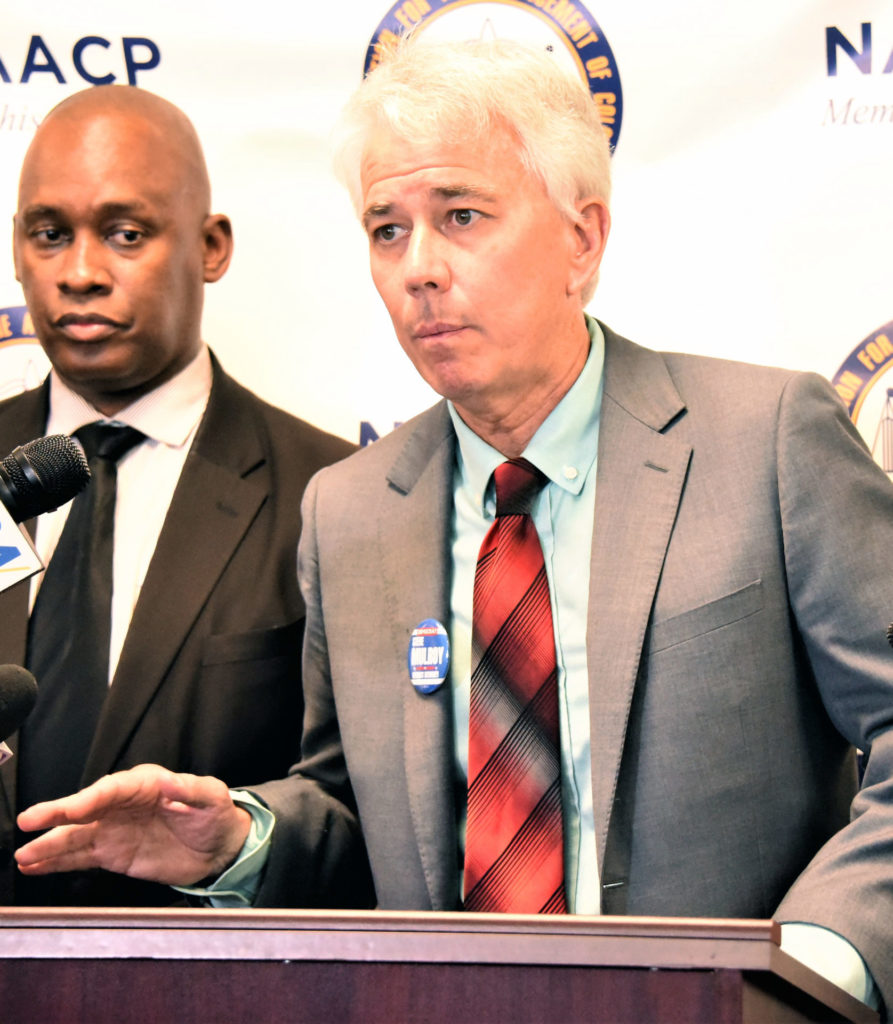An already contentious race sizzled this week as Shelby County District Attorney Amy Weirich pushed back on scathing criticism for opening her campaign headquarters in Germantown on Monday (May 16).
Detractors blasted Weirich as an “out of touch” incumbent at a Tuesday (May 17) news conference. Weirich struck back almost immediately.
Her headquarters is in the Carrefour at Kirby Woods shopping center on the Germantown side of Poplar and Kirby. The Memphis city limit is on the other side of Poplar at the intersection.
Democratic challenger Steve Mulroy’s headquarters is in Poplar Plaza at Poplar and Highland near East Memphis.
Mulroy called a news conference outside Downtown’s Criminal Justice Center to denounce Weirich for her “tone deaf” action.
“The DA opens her HQ in one of the wealthiest, least crime-ridden parts of the county,” Mulroy said. “What’s wrong with that. …Ninety percent of the attorneys there are white, and …90 percent of criminal defendants are Black…”
Weirich declined to publicly address Mulroy’s remarks, but quickly shot back in a phone interview with The New Tri-State Defender.
“That space was donated to me,” said Weirich. “Germantown is in Shelby County, and my headquarters is right in the middle of Shelby County. …Meanwhile, Steve Mulroy opens his headquarters, where some of the largest homes in Shelby County are located.”

Mulroy shares an expansive headquarters with Shelby County Mayor Lee Harris.
As Mulroy and incumbent Weirich face each other, incumbent Harris is being challenged by Memphis City Councilman Worth Morgan in the Aug. 4 county general election.

Mulroy questioned Weirich’s connection to the communities she serves.
“The Germantown ZIP code, 38138, is the third wealthiest in Shelby County,” said Mulroy. “The median income is $101,000, and only five percent of the county’s Blacks live there.”
Weirich said her headquarters is not in a crime-free area, as Mulroy contended.
“Just across the street, two high-profile homicides were committed,” Weirich said. “One was a murder, and the other was ruled justifiable homicide.”
Weirich accused Mulroy of running his campaign on misinformation and half-truths.
“This race is simple,” said Weirich. “Shelby County voters will vote for either holding criminals accountable or not doing so. It all comes down to that.”
Weirich said victims look for justice, and her office has tried to make that happen.
“We are committed to doing justice,” said Weirich. “If someone commits a crime, he must be held accountable. We stand in the interest of the victim’s bill of rights. The victims must always be considered in the prosecution process.”
Mulroy said Weirich’s administration has failed to effectively address violent crime, which is “out of control.” He then made “a clear distinction” in Weirich’s administration and what his term in office would look like.
“I would use a conviction review unit, DNA testing, and other measures to cut down on wrongful convictions,” said Mulroy. “This is the only way to restore trust in the justice system. This would re-establish community cooperation with law enforcement.”
Mulroy said his other two priorities would be: (1) mounting an all-out offensive on violent crime and utilizing more rehabilitation initiatives for youth, rather than punitive, jail time.
Weirich said she does have rehabilitative programs for various offenses and individuals, proving she does not “over-prosecute,” as some have charged.
“Only a small segment of those convicted in Shelby County actually serve time in prison,” said Weirich. “We have a mental health court, a veteran’s court, and other rehabilitative efforts. Many offenders are out in the community working out personal accountability through these programs.”
Weirich praised the “truth in sentencing” law, which the Tennessee legislature passed this year as an effective tool against violent offenders.
“Truth in sentencing was a huge win for Shelby County,” said Weirich. “This bill cancels parole or the possibility of parole for certain felonies, mostly violent offenders,” said Weirich. “These individuals are now serving their full sentence.”
Weirich said a number of efforts have been launched to combat recidivism.
“We do everything we can to make sure that ex-offenders do not come back,” Weirich said.



